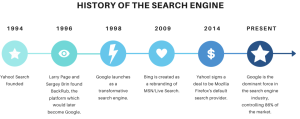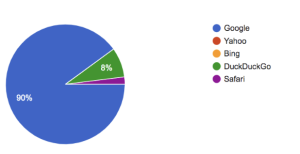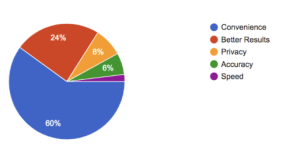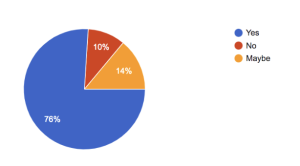3
Jowon Bang; Anamaria C. Buschman; Joseph Gates; Rafael D. Kuc; and Veronica Navarro
When thinking about the dissemination of information, we know that the search engine has transformed the way that information is discovered. In simple terms, a search engine is “a program that searches for and identifies items in a database that correspond to keywords or characters specified by the user, used especially for finding particular sites on the World Wide Web” (Oxford Languages). Today, with a few short keystrokes, researchers, academicians, and other individuals can harness the power of the search engine to answer any question they may conceive. However, fundamentally, search engines are businesses that profit mainly from advertising revenue.
With this taken into consideration, it is important to analyze the role the search engine has in presenting information and how its recipients process this information. Throughout this chapter, we report on a study we conducted of college students’ use and understanding of search engines to determine if they understand how the search engine works, what they think about the accuracy of their results, and how their results directly affect their lives.
One main concern about the internet in general is the potential impact on society. In other words, the internet is the cause of moral panic, which can be defined as “a mass movement based on the false or exaggerated perception that some cultural behavior or group of people is dangerously deviant and poses a threat to society’s values and interests.” (Oxford Reference; see also Chapter 2, “Moral panics: Genuine Concern or Sociological Tool?”).
In recent years, the internet has become a driving force comparable to no other. The internet serves as a place to discover information, interact with others, and play games. Oftentimes, when searching for information or for a specific website, a search engine is used because it expedites these processes. Indeed, most people don’t realize there might be other ways to locate what they are looking for (via URL, for example). Thus, for the purposes of this chapter, we focus on the search engine and its implications on society during the transition from old to new media.
Methods
To effectively analyze this transition, we conducted 10 interviews and polled fifty individuals about their search engine habits and preferences. A majority of our respondents and interviewees were college-aged individuals. In addition, we surveyed a sample of people from older generations to decipher how the use of search engines differs among age groups. Each interviewee was asked eight main questions:
1) What is your preferred search engine? Why do you trust that one?
2) What do you use search engines for? (i.e. academics, friendships, shopping, know-how, medical advice, food recipes, etc.)
3) Are you more likely to trust a book or a Google search?
4) Which do you prefer? Why?
5) Are you more likely to trust the words of a friend or a Google search?
6) Do you ever verify information on multiple websites or other sources or do you believe what you’re shown as truth?
7) What is your general attitude towards censorship?
8) What are some characteristics of a trustworthy website?
Our poll was administered over Google Forms over a 10 day period.
Results
Results of our survey showed that 90% of respondents preferred Google as their search engine of choice. A majority of those that preferred Google responded that they preferred the search engine for its convenience. Other respondents listed DuckDuckGo as their preferred search engine; this is a website that emphasizes its prioritizing of the safety of their users. Each of the respondents that listed DuckDuckGo wrote that their reason for choosing that platform was privacy. One user listed Safari as their chosen search engine. However, Safari is a web browser, not a search engine–showing that the concept of search engine is not always clear, even among people who use them regularly.
The ages of the respondents were as follows:
9-18: 3
19-24: 43
25-30: 3
41-50: 2
51-60: 1
Interview Results
Similar to our poll results, Google was the most common search engine preferred among the interviewed individuals. In total, 10 interviews were conducted on people ranging in age from 17 to 55. Nonetheless, they were all asked the same question without knowledge of other interviewee’s responses.
Do You Know What a Search Engine Is?
When asked whether or not you know what a search engine is, you probably think something like “of course” or “obviously.” If you did not respond this way, there is a chance that you are more of a realist about your internet knowledge. While conducting research, we discovered a stark contrast between what people thought they knew about search engines and what they actually know. In more than one instance, respondents to interview questions answered with the name of an internet browser rather than an actual search engine when asked their search engine preference. Most modern search engines filter search results by calculating how many pages are linked to a given website and then ranking them in a ladder-like fashion to display the most relevant results at the top. Overall, we found that while interviewees could identify different search engines, they couldn’t accurately describe a search engine and the purpose that it serves, other than feeding them information.
How Do You Use Search Engines?
Despite many interviewees not being confident in their definition of what a search engine is, everyone knew what they used them for. “I search engines for almost everything. I use them for academics, socializing, shopping, and looking up random questions,” one college-aged interviewee said. Many answers were similar, emphasizing the large role that the search engine plays in their lives; however nearly all interviewees doubted their reliability. “I’ve always trusted books to have a definite answer,” another interviewee mentioned.
How Do You Prefer to Gather Reliable Information?
Even though Google was the preferred search engine and interviewees doubted its trustworthiness, many respondents still said that it was their preferred way to seek information even compared to what they believed to be more reliable sources like books. The main reason cited as a preference was Google’s speed and ease-of-access, even compared to other search engines like Bing or Yahoo!.
Do You Care about Your Privacy?
When asked this question, many people were inclined to answer yes, however, if you want to protect your personal information you may have to be overly cautious when using search engines. Search engines such as Google and Bing use internet cookies to track the websites you visit and the pages you click on. This information is then transformed into user profiles and used to target users with relevant advertisements. Nonetheless, when college-aged students were asked about search engines, they still had their doubts about its dependability.
Interviewees identifying as older than 19-24 were more likely to choose more private search engines, like DuckDuckGo. This search engine prioritizes users’ privacy and avoids filtering search results. It yields results that are less personalized to an individual in order to protect personal information; this is in stark contrast to Google, which stores personal data. One interviewee noted that they use DuckDuckGo for all searches because it “doesn’t sell [their] information like other [search] engines” do. This user was in their fifties and used Google for many years until finding that their privacy was at risk. They felt that the curated search results “put limitations on the content [they were] looking for.” DuckDuckGo and search engines similar to it supply users with a broad range of results, unlike Google which creates a “filter bubble.” Most of the time, individuals are unaware that data is being collected on them for their own personal bubble. Even with the risk of personal data being used and stored, only 8% of those surveyed prioritized their privacy during their search engine experience.

Significance
According to Statista, Google holds an 86% market share of the search engine industry, making it unsurprising that Google was the most preferred search engine and way of seeking information ( Johnson, 2021). In 2017, around 30 million children in the United States used Google education apps; this means that the primary search engine that they were taught on was Google (Singer, 2017). Given that the University of Notre Dame utilizes Google as its email source, it follows that our numbers are skewed in favor of Google, as many of the individuals surveyed were college students at Notre Dame. In an interview with a college aged student he stated that “Google is my preferred search engine because of its interconnected nature. With Google, I can easily use my search results to find scholarly articles that I can integrate into my Google Docs and Slides presentation.” For college students, Google serves a convenient and interconnected platform. But do these opinions hold true for older generations? In another interview response, a 55-year-old stated that their preferred platform is Google because of its prevalence. “I’m not that familiar with other platforms and Google is the most popular. I don’t use the computer enough to know any other search engines,” the individual said. Google’s broad reach seems to have made it the preferred search engine for older generations as well.
From a business perspective, Google thrives on a connected ecosystem which propelled them to a market capitalization of almost $2 trillion (Yahoo! Finance). Skeptics of new media argue that Google operates under a self serving model (Rieder and Sire, 2014). Google’s primary source of revenue is from selling advertisements. These advertisements allow companies to appear at the top of a given search rather than simply sorting the information from most to least relevant. Furthermore, Google can sell advertisements that target a specific demographic or subset of people though using internet cookies. Internet cookies are used to carry information from website to website, or between sessions on related websites, without having to burden a server machine with massive amounts of data storage (CookiePro, 2020). By tracking users’ data from one website to another, Google compiles user profiles that are then used to target advertisements. Although there are individuals who are fearful of Google knowing “too much” about them, others believe there is a threshold of information that Google should know. When asked about the presence of targeted advertisements, a college aged student stated that he “likes having relevant advertisements based on search results but gets creeped out if it was something he never looked up.”
Interestingly, there was a disparity in interview answers based on age. When asked if they were more likely to trust a Google search or a book, one college student replied that he usually seeks reliable websites because “books can be a bit outdated.” A 55-year-old had a different response to the same question, stating that they trust books more because “Not everything on Google is correct. I trust books more because I grew up using them and not everything on websites is true.” Another interviewee aged in their fifties noted that “[books] present themselves exactly as the author intended,” implying that Google can typically give false information. Some people are suspicious since Google can pull up websites and results that may not be from credible sources and prefer books which they consider more reliable. This logic stems from the fear of the unknown, which is often what drives moral panics in society (Cohen, 1999). The student, who has developed the skills necessary to effectively navigate the internet, spot reliable sources, and fact-check information with a couple strokes of the keyboard understands the utility of online search engines. Those who are older, however, are more familiar with using books and have reservations about trusting Google searches.
When surveyed, most individuals (60%) noted that their preferred search engine was used out of convenience. With a plethora of knowledge one click away, people have the ability to access information almost anywhere and anytime. But, how accurate is this information? Does convenience mean that accuracy has to be sacrificed?
The internet and its usage has brought about a moral panic in today’s world (see chapters 2 “Moral Panics: Genuine Concern or Social Tool?” and 3, “Panic! At the Search Engine”). While the internet holds the answers to our most pressing questions and issues, it also contains inappropriate or misleading content that can be misused. Additionally, the “filter bubble” has led to concerns regarding the accuracy of information found on the internet. Fear of the unknown and filtering has fueled this panic.
Survey Results

Figure 1: What is your preferred search engine?

Figure 2: Why do you prefer the search engine you use?

Figure 3: Do you trust certain search engines over others?
References
“Alphabet Inc. (GOOGL) Stock Price, News, Quote & History,” Yahoo! Finance (Yahoo!, December 5, 2021), https://finance.yahoo.com/quote/GOOGL?p=GOOGL&.tsrc=fin-srch.
Cohen, Stanley. “Contributors.” Paedagogica Historica 35, no. 3 (1999): 588–89. https://doi.org/10.1080/0030923990350302.
Guillaume Sire Bernhard Rieder, “Conflicts of Interest and Incentives to Bias: A Microeconomic Critique of Google’s Tangled Position on the Web – Bernhard Rieder, Guillaume Sire, 2014,” SAGE Journals, accessed December 5, 2021, https://journals.sagepub.com/doi/full/10.1177/1461444813481195.
Joseph Johnson, “Search Engine Market Share Worldwide,” Statista, October 8, 2021, https://www.statista.com/statistics/216573/worldwide-market-share-of-search-engines/.
Moral Panic.” Oxford Reference, https://www.oxfordreference.com/view/10.1093/oi/authority.20110803100208829
“Oxford Languages and Google – English,” Oxford Languages, accessed December 1, 2021, https://languages.oup.com/google-dictionary-en/.
Singer, Natasha. “How Google Took over the Classroom.” The New York Times, The New York Times, 13 May 2017, https://www.nytimes.com/2017/05/13/technology/google-education-chromebooks-schools.html.
“What Is the Purpose of a Cookie?,” CookiePro, April 27, 2020, https://www.cookiepro.com/knowledge/purpose-of-cookies/.
